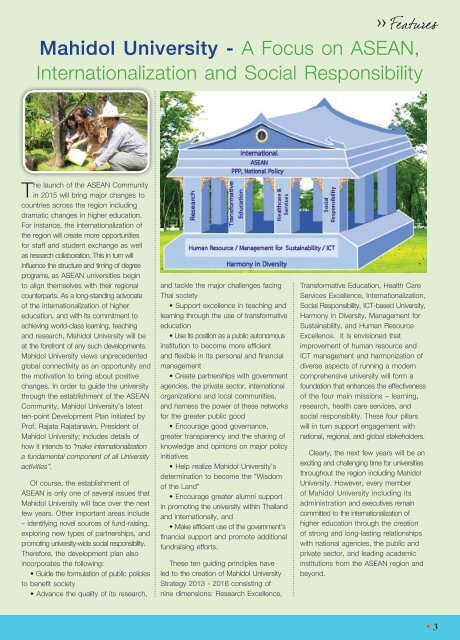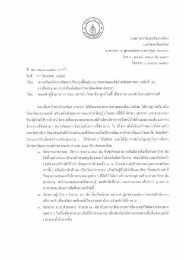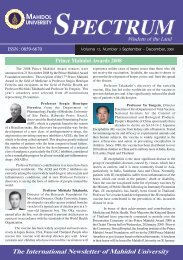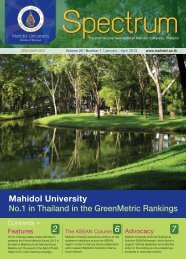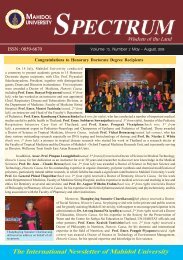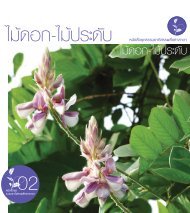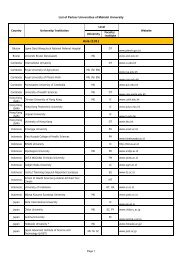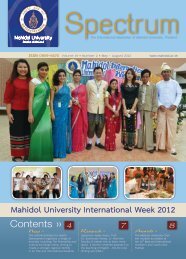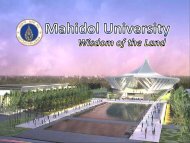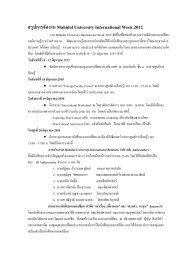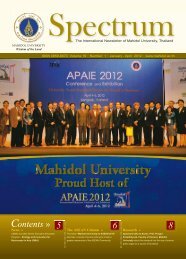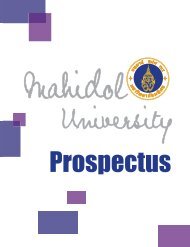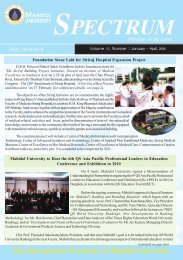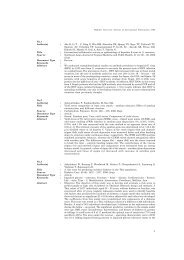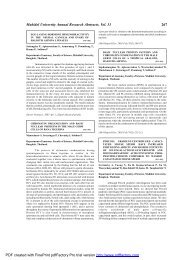Volume 19 Number 3 (September - December 2012) - Mahidol ...
Volume 19 Number 3 (September - December 2012) - Mahidol ...
Volume 19 Number 3 (September - December 2012) - Mahidol ...
You also want an ePaper? Increase the reach of your titles
YUMPU automatically turns print PDFs into web optimized ePapers that Google loves.
<strong>Mahidol</strong> University - A Focus on ASEAN,<br />
Internationalization and Social Responsibility<br />
The launch of the ASEAN Community<br />
in 2015 will bring major changes to<br />
countries across the region including<br />
dramatic changes in higher education.<br />
For instance, the internationalization of<br />
the region will create more opportunities<br />
for staff and student exchange as well<br />
as research collaboration. This in turn will<br />
influence the structure and timing of degree<br />
programs, as ASEAN universities begin<br />
to align themselves with their regional<br />
counterparts. As a long-standing advocate<br />
of the internationalization of higher<br />
education, and with its commitment to<br />
achieving world-class learning, teaching<br />
and research, <strong>Mahidol</strong> University will be<br />
at the forefront of any such developments.<br />
<strong>Mahidol</strong> University views unprecedented<br />
global connectivity as an opportunity and<br />
the motivation to bring about positive<br />
changes. In order to guide the university<br />
through the establishment of the ASEAN<br />
Community, <strong>Mahidol</strong> University’s latest<br />
ten-point Development Plan initiated by<br />
Prof. Rajata Rajatanavin, President of<br />
<strong>Mahidol</strong> University; includes details of<br />
how it intends to “make internationalization<br />
a fundamental component of all University<br />
activities”.<br />
Of course, the establishment of<br />
ASEAN is only one of several issues that<br />
<strong>Mahidol</strong> University will face over the next<br />
few years. Other important areas include<br />
– identifying novel sources of fund-raising,<br />
exploring new types of partnerships, and<br />
promoting university-wide social responsibility.<br />
Therefore, the development plan also<br />
incorporates the following:<br />
• Guide the formulation of public policies<br />
to benefit society<br />
• Advance the quality of its research,<br />
and tackle the major challenges facing<br />
Thai society<br />
• Support excellence in teaching and<br />
learning through the use of transformative<br />
education<br />
• Use its position as a public autonomous<br />
institution to become more efficient<br />
and flexible in its personal and financial<br />
management<br />
• Create partnerships with government<br />
agencies, the private sector, international<br />
organizations and local communities,<br />
and harness the power of these networks<br />
for the greater public good<br />
• Encourage good governance,<br />
greater transparency and the sharing of<br />
knowledge and opinions on major policy<br />
initiatives<br />
• Help realize <strong>Mahidol</strong> University’s<br />
determination to become the “Wisdom<br />
of the Land”<br />
• Encourage greater alumni support<br />
in promoting the university within Thailand<br />
and internationally, and<br />
• Make efficient use of the government’s<br />
financial support and promote additional<br />
fundraising efforts.<br />
These ten guiding principles have<br />
led to the creation of <strong>Mahidol</strong> University<br />
Strategy 2013 - 2016 consisting of<br />
nine dimensions: Research Excellence,<br />
Transformative Education, Health Care<br />
Services Excellence, Internationalization,<br />
Social Responsibility, ICT-based University,<br />
Harmony in Diversity, Management for<br />
Sustainability, and Human Resource<br />
Excellence. It is envisioned that<br />
improvement of human resource and<br />
ICT management and harmonization of<br />
diverse aspects of running a modern<br />
comprehensive university will form a<br />
foundation that enhances the effectiveness<br />
of the four main missions – learning,<br />
research, health care services, and<br />
social responsibility. These four pillars<br />
will in turn support engagement with<br />
national, regional, and global stakeholders.<br />
Clearly, the next few years will be an<br />
exciting and challenging time for universities<br />
throughout the region including <strong>Mahidol</strong><br />
University. However, every member<br />
of <strong>Mahidol</strong> University including its<br />
administration and executives remain<br />
committed to the internationalization of<br />
higher education through the creation<br />
of strong and long-lasting relationships<br />
with national agencies, the public and<br />
private sector, and leading academic<br />
institutions from the ASEAN region and<br />
beyond.<br />
• 3


